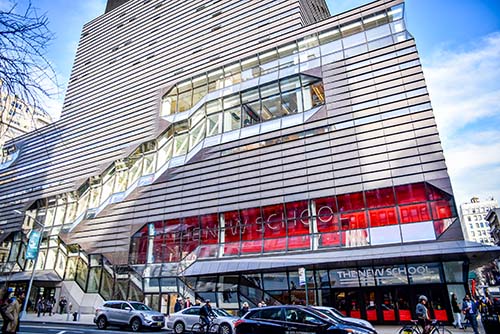MAYOR’S OFFICE OF CLIMATE AND ENVIRONMENTAL JUSTICE SELECTS INTERDISCIPLINARY RESEARCH TEAM LED BY THE NEW SCHOOL TO STUDY CLIMATE VULNERABILITY, IMPACT AND ADAPTATION IN NEW YORK CITY

Partners from Academic Institutions, NGOs, and Private Sector to Work with NYC’s Department of Citywide Administrative Services and the Mayor’s Office of Climate and Environmental Justice to develop data and analysis on future climate conditions and the socio-economic impacts of climate risks
New York, September 8, 2022—A team of interdisciplinary researchers, co-led by Professors Joel Towers and Dr. Timon McPhearson at The New School’s Tishman Environment and Design Center and Urban Systems Lab, was selected by the Mayor’s Office of Climate and Environmental Justice (MOCEJ), to carry out a $2.5M study on future climate change and its potential impacts to inform decision-making by the City of New York and assessment reports by the NYC Panel on Climate Change.
The team includes scientists from nine academic institutions (The New School, Columbia University, Cornell University, City University of New York, Drexel University, Lamont Doherty Earth Observatory, Sarah Lawrence College, Science and Resilience Institute at Jamaica Bay, and Stevens Institute of Technology), four governmental institutions and nonprofit organizations (Natural Resources Defense Council, Population Council, NASA/GISS, and USDA Forest Service) and from the private sector (Arcadis). Together, this team will work collaboratively to develop a comprehensive analysis of future potential climate conditions and associated socio-economic impacts in New York City. Specifically, the team will:
Develop climate projections for the NYC region, including high resolution heat risk and exposure projections, storm surge risk analysis, and coastal flood mapping,
Characterize current and future extreme heavy rainfall in New York City,
Conduct a systematic assessment of health-related economic costs from climate-sensitive events in New York City, and
Create a Coastal Flooding Vulnerability Index for New York City
New York City is already experiencing multiple impacts of climate change from rising sea levels and heavier rain events to more frequent and severe heat waves. Structural inequalities cause certain communities to experience these impacts more often or more severely than others. For many communities, issues like employment, affordable housing, and education are longstanding concerns that intersect with climate change. The overall goal of the study is to bring together scientific and local information on social and economic vulnerability, public health and climate change to inform policy and action for communities most vulnerable and at-risk, and to understand the opportunities and tradeoffs from various mitigation and adaptation strategies. As a result of this research, MOCEJ will be better equipped to make more informed policy decisions that take into consideration current and future climate conditions and subsequent socio-economic impacts.
This project was awarded through the Master Academic Consortium Contract, managed by Town+Gown, a citywide university-community partnership program which brings academics and practitioners together to create knowledge in the built environment.
Joel Towers, University Professor of Architecture and Sustainable Design, and Timon McPhearson, Professor of Urban Ecology at The New School, are leading this effort. Towers co-directs The Tishman Center for Environment and Design, which integrates bold design, policy and social justice approaches to tackle the climate crisis and advance environmental justice. McPhearson directs the Urban Systems Lab, an interdisciplinary research, design and practice space at The New School that provides knowledge and analysis for developing more equitable, resilient, and sustainable cities.
Founded in 1919, The New School was established to advance academic freedom, tolerance, and experimentation. A century later, The New School remains at the forefront of innovation in higher education, inspiring approximately 10,000 undergraduate and graduate students to challenge the status quo in design and the social sciences, liberal arts, management, the arts, and media. The university welcomes thousands of adult learners annually for continuing education courses and public programs that encourage open discourse and social engagement. Through our online learning portals, research institutes, and international partnerships, The New School maintains a global presence.